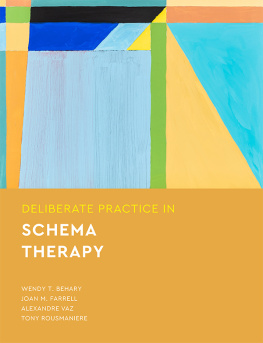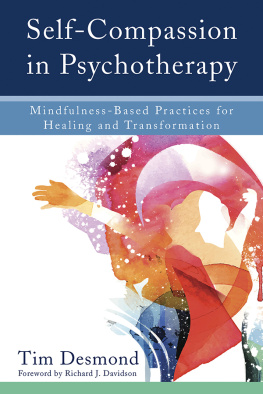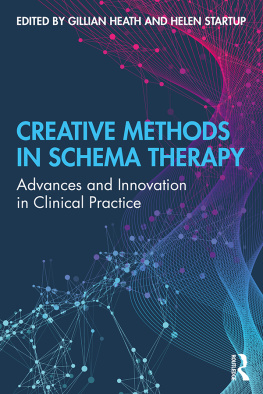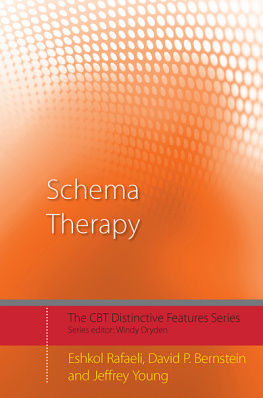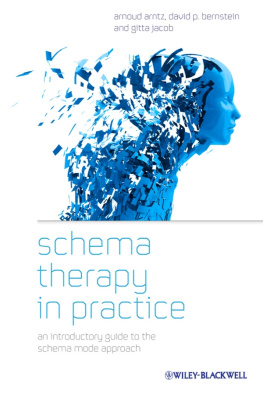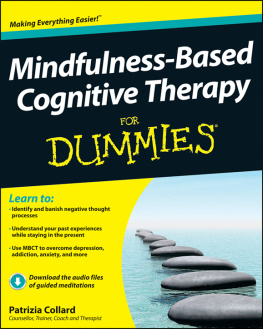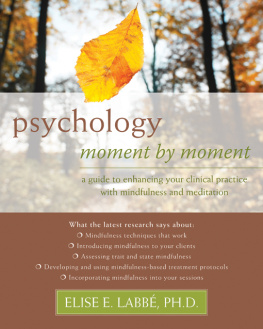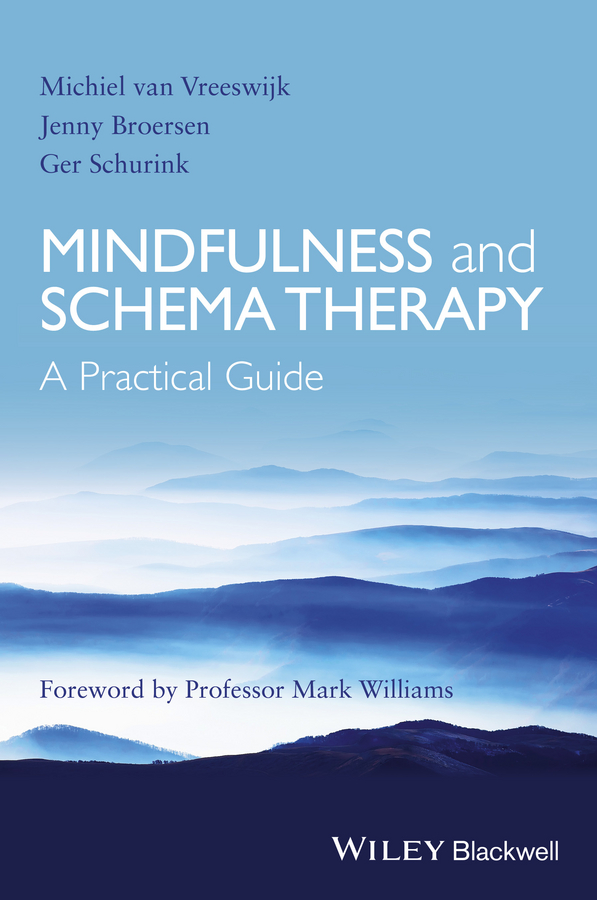
CONTENTS
List of Tables
- Chapter 02
- Chapter 09
Guide
Pages
Mindfulness and Schema Therapy
A Practical Guide
Michiel van Vreeswijk
Jenny Broersen
Ger Schurink
Translation by Jan van der Tempel
This edition first published 2014
2014 John Wiley & Sons, Ltd.
Registered Office
John Wiley & Sons, Ltd, The Atrium, Southern Gate, Chichester, West Sussex, PO19 8SQ, UK
Editorial Offices
350 Main Street, Malden, MA 02148-5020, USA
9600 Garsington Road, Oxford, OX4 2DQ, UK
The Atrium, Southern Gate, Chichester, West Sussex, PO19 8SQ, UK
For details of our global editorial offices, for customer services, and for information about how to apply for permission to reuse the copyright material in this book please see our website at www.wiley.com/wiley-blackwell.
The right of Michiel van Vreeswijk, Jenny Broersen and Ger Schurink to be identified as the author of this work has been asserted in accordance with the UK Copyright, Designs and Patents Act 1988.
All rights reserved. No part of this publication may be reproduced, stored in a retrieval system, or transmitted, in any form or by any means, electronic, mechanical, photocopying, recording or otherwise, except as permitted by the UK Copyright, Designs and Patents Act 1988, without the prior permission of the publisher.
Wiley also publishes its books in a variety of electronic formats. Some content that appears in print may not be available in electronic books.
Designations used by companies to distinguish their products are often claimed as trademarks. All brand names and product names used in this book are trade names, service marks, trademarks or registered trademarks of their respective owners. The publisher is not associated with any product or vendor mentioned in this book.
Limit of Liability/Disclaimer of Warranty: While the publisher and authors have used their best efforts in preparing this book, they make no representations or warranties with respect to the accuracy or completeness of the contents of this book and specifically disclaim any implied warranties of merchantability or fitness for a particular purpose. It is sold on the understanding that the publisher is not engaged in rendering professional services and neither the publisher nor the author shall be liable for damages arising herefrom. If professional advice or other expert assistance is required, the services of a competent professional should be sought.
Library of Congress Cataloging-in-Publication Data
Vreeswijk, Michiel van.
Mindfulness and schema therapy : a practical guide / Michiel van Vreeswijk, Jenny Broersen, Ger Schurink.
pagescm
Includes bibliographical references and index.
ISBN 978-1-118-75318-7 (cloth) ISBN 978-1-118-75317-0 (pbk.)1. Attention.2. Schema-focused cognitive therapy.I. Title.
BF321.V74 2014
616.891425dc23
2014005686
A catalogue record for this book is available from the British Library.
Cover image: Mikadun/Shutterstock
Cover design by Design Deluxe
About the Authors
Michiel van Vreeswijk, MSc, is a clinical psychologist, psychotherapist, cognitive-behavioral therapist, certified supervisor in schema therapy and co-director at G-kracht mental health care institute, The Netherlands. He is affiliated as a trainer in schema therapy and cognitive-behavior therapy at several post-doctoral institutes for psychologists and psychiatrists in The Netherlands. He is also affiliated with the RINO Group as main lecturer of psycho-diagnostic assessment. He regularly gives schema therapy workshops in the UK, Germany, other countries, and at conferences of the International Society of Schema Therapy (ISST). He researches schema group therapy and is the (co-)author of many journal articles and books in English, German and Dutch.
Jenny Broersen, MSc, is a mental health care psychologist and psychotherapist. She is a supervisor in cognitive-behavior therapy and schema therapy (Dutch register Schema Therapy and International Society of Schema Therapy). During the last 15 years she has worked in outpatient and day treatment settings. Broersen is the site director of G-kracht psychomedisch centrum BV in Amsterdam, together with her colleague Marjon Nadort. She also works in the mental health care institute GGZ Delfland in Delft (The Netherlands). She is co-author/editor of several schema books, chapters, and articles and gives post-doctoral courses in schema therapy and cognitive-behavior therapy.
Ger Schurink, MSc, is a psychotherapist, health psychologist, and cognitive-behavioral therapist. He is a certified supervisor in cognitive-behavior therapy, has a private practice in The Netherlands, and is a trainer in Mindfulness Based Cognitive Therapy. He is the (co-)author of several books and articles.
Foreword
The field of psychological science is undergoing something of a revolution in the way it sees the origin and maintenance of emotional problems. From this vision a new way of helping those people who come to therapy is emerging. This book contributes to this development.
In the 1970s and 1980s the main concern of research in clinical psychology was to investigate biases in information processing. The field was dominated by experiments demonstrating, again and again, the extent to which people suffering from depression or from anxiety disorders of various kinds, showed biases in the way they attended to their internal or external environment; biases in the way they remembered the past or anticipated the future; biases in their judgments and interpretations. Part of this approach was research on schemas. Schemas are information-processing structures that normally assist in the streamlining of encoding and retrieval of complex sets of information. Such structures are enormously valuable in making cognitive processing efficient, but they can also make habitual the biases that are seen elsewhere in the information-processing system, establishing them into a biased sense of self, me, and how I am. When such patterns of processing become automatic in this way, these habitual reactions in thinking, feeling, and interacting with the world coalesce to form higher-order patterns: this we label personality.
This phase of the development of cognition and emotion research was hugely influential and highly productive in terms of its effects on cognitive and behavioral approaches. Yet gradually, as more research was done, we saw that there were other elements in the picture. In particular, we began to see that the ways people react to their own biased processing could determine whether the reaction would be maintained and exacerbate, or extinguish and fade. It was found that emotional problems were often maintained not only by the bias in attention, memory, judgments, or schemas, but by the processes that come on line to try and deal with such biases. Chief among these are two processes: the tendency to elaborate, become enmeshed in, or ruminate about things on the one hand; and the tendency to avoid, suppress, and push things away on the other. Dealing with these tendencies had always been implicit within cognitive and behavioral approaches, but the increasing awareness of the power of these ruminative and avoidance processes gave a new impetus to attempts to find explicit ways of dealing with them.
Next page

